Lost In Myth: “Sundown”—Temptation of the Dark Side
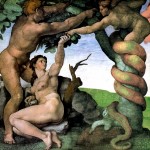 Whereas “Lighthouse” was all about our enlightenment, “Sundown” explored our dark side—temptation. “I can see her lying back in her satin dress in a room where you do what you don’t confess,” sang Gordon Lightfoot in his 1974 hit “Sundown.” The song is all about succumbing to temptation, hence once again revealing the double entendre that the Lost writers are so fond of using in their episode titles. When the sun goes down, man gets tempted by the dark. Why a “satin” dress? Sounds like Satan, don’t it?
Whereas “Lighthouse” was all about our enlightenment, “Sundown” explored our dark side—temptation. “I can see her lying back in her satin dress in a room where you do what you don’t confess,” sang Gordon Lightfoot in his 1974 hit “Sundown.” The song is all about succumbing to temptation, hence once again revealing the double entendre that the Lost writers are so fond of using in their episode titles. When the sun goes down, man gets tempted by the dark. Why a “satin” dress? Sounds like Satan, don’t it?
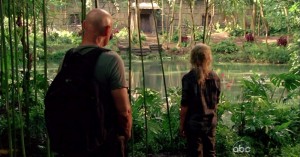 The song “Sundown” was inspired by Cathy Smith, Gord’s mistress at the time who he later claimed in interviews was “the one woman in my life who most hurt me.” Actually, Gord may have gotten off easy. Easier than John Belushi anyway, into whom Cathy injected a fatal drug overdose. So is the message of the episode “Sundown” that women are nothing but temptations that should be avoided? Not at all. In fact, the end of the episode hinted that the one hope the island has for survival is from a woman. But we’ll get to that later.
The song “Sundown” was inspired by Cathy Smith, Gord’s mistress at the time who he later claimed in interviews was “the one woman in my life who most hurt me.” Actually, Gord may have gotten off easy. Easier than John Belushi anyway, into whom Cathy injected a fatal drug overdose. So is the message of the episode “Sundown” that women are nothing but temptations that should be avoided? Not at all. In fact, the end of the episode hinted that the one hope the island has for survival is from a woman. But we’ll get to that later.
Metaphorically speaking, if the skeletons in the cave are Adam and Eve, and the island is Eden, and Jacob is God, who is the snake? If there was ever any doubt, in this episode it became clear that it is the smoke monster, or should we say, snake monster. He slithers about, he deceives by mixing truth with lies (promising Claire that he will retrieve Aaron from the Temple, yet, Kate is there so who knows), and now, we see that he is tempting the Losties with forbidden fruit. In addition to promising Claire that he will get Aaron back, he promises Sawyer the answer to the question of why he’s on the island, he promises Sayid to reunite him with his deceased love, and just like the serpent in Eden, he seems to be speaking the truth.
For the record, while I’m using the Adam and Eve myth as the morality parable it is most often associated with, to be clear, I do not subscribe to this perspective. The story of the Garden of Eden is ultimately not about morals, good and evil, or even temptation. It is about the creation of our physical universe with the tree of knowledge of good and evil representing opposites that exist in a physical world, as opposed to morality. It could have just as easily been the tree of knowledge of light and dark or up and down. 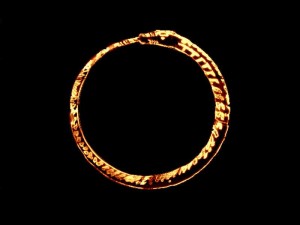 The snake symbolizes time that also only exists in the physical realm. (Possibly because the snake sheds its skin. The symbol of the snake with its tail in its mouth is known as Ouroboros and represents the repeating cycle of time, not putting your foot in your mouth after succumbing to temptation.) Put it all together and the eating of the fruit is symbolic of the creation of our physical world. Period. The misinterpretation of the story that has formed the basis of the world’s patriarchal religions is pretty much responsible for most of the problems throughout our history—wars, ego, pride, discrimination, bigotry, self-righteousness, witch hunts, male chauvinism, etc. But that’s a column for another day. Here, we are talking about temptation.
The snake symbolizes time that also only exists in the physical realm. (Possibly because the snake sheds its skin. The symbol of the snake with its tail in its mouth is known as Ouroboros and represents the repeating cycle of time, not putting your foot in your mouth after succumbing to temptation.) Put it all together and the eating of the fruit is symbolic of the creation of our physical world. Period. The misinterpretation of the story that has formed the basis of the world’s patriarchal religions is pretty much responsible for most of the problems throughout our history—wars, ego, pride, discrimination, bigotry, self-righteousness, witch hunts, male chauvinism, etc. But that’s a column for another day. Here, we are talking about temptation.
 On the island, Sayid has taken a bite of the snake monster’s forbidden fruit—killing Dogen in exchange for the chance to be reunited with his beloved Nadia. Ah, what Sayid will do for a woman. The writers are really trying to get us to believe that the flash-sideways are a result of the snake monster’s granted wishes. This may entirely be the case, but I’m not convinced. The major reason is that in Sayid’s flash-sideways, Nadia is indeed alive and in love with him, but married to his brother. Is this simply an example of the infamous genie/leprechaun trickster myth—be careful what you wish for because you’ll get it but not as you want it? Perhaps, but for the first time in any Sayid-centric episode, Sayid resists the temptation.
On the island, Sayid has taken a bite of the snake monster’s forbidden fruit—killing Dogen in exchange for the chance to be reunited with his beloved Nadia. Ah, what Sayid will do for a woman. The writers are really trying to get us to believe that the flash-sideways are a result of the snake monster’s granted wishes. This may entirely be the case, but I’m not convinced. The major reason is that in Sayid’s flash-sideways, Nadia is indeed alive and in love with him, but married to his brother. Is this simply an example of the infamous genie/leprechaun trickster myth—be careful what you wish for because you’ll get it but not as you want it? Perhaps, but for the first time in any Sayid-centric episode, Sayid resists the temptation.
 As I wrote about in “‘He’s Our You’—How Proxies Play a Role In Our Lives”: “Throughout his life, Sayid has continually been revisited by a particular archetype—that of a strong, confident woman who is able to mesmerize and ultimately entrap him.” He is lured in by the ladies and then beat up by them. From Ilana and Elsa to Rousseau and Amira, Sayid kept repeating the same mistakes by falling for the temptation of lust or violence. But in his flash-sideways, Sayid finally falls for neither. Not only does he not commit adultery with Nadia and dishonor his brother, he also does not seek out revenge—it finds him. In this way, Sayid is redeemed. As far as I’m concerned, his final act of violence in the flash-sideways was in self-defense, as well as in defense of his brother’s family.
As I wrote about in “‘He’s Our You’—How Proxies Play a Role In Our Lives”: “Throughout his life, Sayid has continually been revisited by a particular archetype—that of a strong, confident woman who is able to mesmerize and ultimately entrap him.” He is lured in by the ladies and then beat up by them. From Ilana and Elsa to Rousseau and Amira, Sayid kept repeating the same mistakes by falling for the temptation of lust or violence. But in his flash-sideways, Sayid finally falls for neither. Not only does he not commit adultery with Nadia and dishonor his brother, he also does not seek out revenge—it finds him. In this way, Sayid is redeemed. As far as I’m concerned, his final act of violence in the flash-sideways was in self-defense, as well as in defense of his brother’s family.
This does not seem to be the granting of a wish, but rather, a final test or result of passing his tests. He tells his brother that he is no longer a man who seeks out violence, and tells Nadia that because of what he’s done in his past, he is not worthy of her. Here, he has clearly passed, and is rewarded by successfully beating the bad guys and rescuing Jin. On the island though, it’s another story. While he tells Dogen that he’s changed, he’s still not quite there and has been lured by temptation. 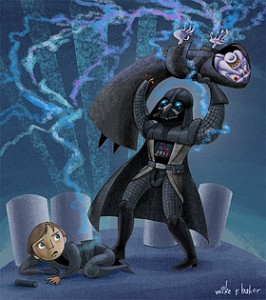 Off-island Sayid has been redeemed, but on-island Sayid still has work to do. Will Christian Shephard come to the rescue and much like Anakin Skywalker, trade sides in the end to overthrow the chief bad guy and save the rebellion…and himself? Perhaps. Or perhaps the savior will be someone completely unexpected—at least from the snake monster’s perspective.
Off-island Sayid has been redeemed, but on-island Sayid still has work to do. Will Christian Shephard come to the rescue and much like Anakin Skywalker, trade sides in the end to overthrow the chief bad guy and save the rebellion…and himself? Perhaps. Or perhaps the savior will be someone completely unexpected—at least from the snake monster’s perspective.
“That boy is our only hope,” the ghost of Obi-Wahn laments to Yoda in The Empire Strikes Back. “No,” Yoda replies, “there may be another.” It’s always kind of disappointed me that Return of the Jedi really didn’t play up on this comment by having Leia somehow use her Jedi powers to save the day. I think it would’ve been cool if she showed up the boys. As with Star Wars, in Lost, all the serious contenders for candidacy seem to also be men. Of the six infamous numbers, all seem to be men, and Kate’s name isn’t even anywhere to be found in the cave. Despite being described by the snake monster as Jacob’s cave, I’m still leaning towards the possibility that it’s his. At the very least, it doesn’t seem like the lighthouse and the cave would both be Jacob’s. Why would he need to write down the numbers and names twice? I’ve heard a theory that perhaps the lighthouses belongs to the Man In Black and that’s why Jacob wanted it smashed. Cool idea, but mythologically, if Jacob does represent light, it should be his while the underground cavern should represent dark, earth energy or the Man In Black.
 Since we did not see Kate’s name on the cave wall, the implication is that she is not a serious contender for candidacy, and might not be a threat to the Man In Black’s loophole plan. But while the Man In Black “can picture every move that a man can make, getting lost in her lovin’ is [his] first mistake. Every move??? As in a game???? And like Gordon is he too making a mistake by underestimating a woman? The song also provides another hint: “Sometimes I think it’s a sin when I feel like I’m winning when I’m losing again.” I feel this is exactly where the Man In Black is at. Jacob has a loophole of his own, and like most villains, the Man In Black’s ego blinds him of the unsuspecting threat to his plan—Kate.
Since we did not see Kate’s name on the cave wall, the implication is that she is not a serious contender for candidacy, and might not be a threat to the Man In Black’s loophole plan. But while the Man In Black “can picture every move that a man can make, getting lost in her lovin’ is [his] first mistake. Every move??? As in a game???? And like Gordon is he too making a mistake by underestimating a woman? The song also provides another hint: “Sometimes I think it’s a sin when I feel like I’m winning when I’m losing again.” I feel this is exactly where the Man In Black is at. Jacob has a loophole of his own, and like most villains, the Man In Black’s ego blinds him of the unsuspecting threat to his plan—Kate.
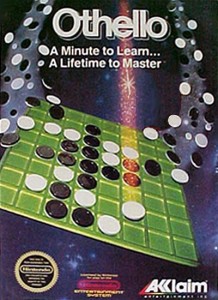 I’m not a big backgammon player, but I’ve got a mean Othello strategy. And I’ll tell you exactly what it is: let the other player take up the entire middle of the board so he thinks he’s winning, then, once he’s surrounded himself with himself and has no moves to make, use your edges to turn the tide and flip over all his pieces in mighty swoops.
I’m not a big backgammon player, but I’ve got a mean Othello strategy. And I’ll tell you exactly what it is: let the other player take up the entire middle of the board so he thinks he’s winning, then, once he’s surrounded himself with himself and has no moves to make, use your edges to turn the tide and flip over all his pieces in mighty swoops.
 At the very end of the episode, the Man In Black seems to be in a very good position. He’s killed Jacob, killed everyone in the temple who he hasn’t recruited, and even gotten a possible new candidate to join his team. He gives Kate an intrigued look, but then confidently leads his team to certain victory. Yet, just as Kate got Sawyer and Juliet to turn the sub around, I
At the very end of the episode, the Man In Black seems to be in a very good position. He’s killed Jacob, killed everyone in the temple who he hasn’t recruited, and even gotten a possible new candidate to join his team. He gives Kate an intrigued look, but then confidently leads his team to certain victory. Yet, just as Kate got Sawyer and Juliet to turn the sub around, I  think she is going to begin to flip over all of the Man In Black’s pieces right back to white. I could be wrong, but I hope not because there is a very strong goddess energy in the air these days and I’d love to write a column about it. We just need an episode with that as the focus to make it happen.
think she is going to begin to flip over all of the Man In Black’s pieces right back to white. I could be wrong, but I hope not because there is a very strong goddess energy in the air these days and I’d love to write a column about it. We just need an episode with that as the focus to make it happen.
The writers have actually given another slight hint that it might be a woman who tricks the Man In Black. Considering that up until now, all the Season 6 episodes have been following the same order of character-focused episodes as Season 1 (they’ve both focused first on everyone, then Kate, Locke, and Jack), many people assumed this episode would center around Sun since she was next in the lineup. The Season 1 episode with her was called “House of the Rising Sun,” and this Season 6 one was also a play on her name. However, it was all a ruse. The episode focused on Sayid and his love for a woman. I don’t think this title was chosen by accident.
The insinuation might be that just as we took it for granted that a woman would play a role as we expected, the Man In Black may be fooled as well. Kate, Sun, or possibly even Ilana, may give the Man In Black a challenge he wasn’t expecting. If so, that will be a great episode to talk about the goddess.
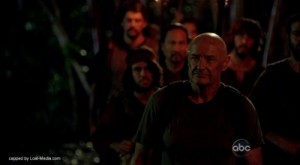 In the meantime though, what was the message of this episode for us? The theme was obviously about temptation—about making deals with the devil. We all have our weaknesses, and the universe (devil, Satan, Lucifer, Beelzebub, serpent, anti-Christ, whatever you wanna call it) will continually tempt us with whatever it is. Every time we resist, we get that much stronger to make the right choice the next time. However, when we give in, we reap the repercussions. Not to worry though, because either way, you’ll get tested again. No matter what your weakness, you will continually be tested until you successfully overcome it and then successfully pass the multiple retests. Why does the world work this way? Why can’t we just indulge in sex, violence, junk food, and alcohol whenever we want? Well, we can—the choice is ours. But without having vices in this world that we know we shouldn’t give into that often if at all, there would really be no challenge in living life. It would just be like the Garden of Eden where everything was handed to us.
In the meantime though, what was the message of this episode for us? The theme was obviously about temptation—about making deals with the devil. We all have our weaknesses, and the universe (devil, Satan, Lucifer, Beelzebub, serpent, anti-Christ, whatever you wanna call it) will continually tempt us with whatever it is. Every time we resist, we get that much stronger to make the right choice the next time. However, when we give in, we reap the repercussions. Not to worry though, because either way, you’ll get tested again. No matter what your weakness, you will continually be tested until you successfully overcome it and then successfully pass the multiple retests. Why does the world work this way? Why can’t we just indulge in sex, violence, junk food, and alcohol whenever we want? Well, we can—the choice is ours. But without having vices in this world that we know we shouldn’t give into that often if at all, there would really be no challenge in living life. It would just be like the Garden of Eden where everything was handed to us.
As I mentioned in “Why LOST Can Be A Substitute For ‘Willy Wonka’” it’s like that scene in The Matrix when agent Smith tells Morpheus that humans rejected the first matrix program where everything was perfect. That program was our mythological Garden of Eden. And it was torturously boring. Much like the Man In Black, Satan isn’t truly evil. It just represents the challenge that enables us to see what we’re made of. The Garden of Eden is cool at first, but after a while it gets really old. There’s a great Twilight Zone where this crook gets shot and finds himself in Heaven. He can have everything he desires. At first, he loves it. But after several months, he begs to be sent to Hell instead. It is then that he is told that he’s already there.
So don’t hate the struggle. Embrace it. It makes life interesting. Without it, there would be nothing for us to overcome, nothing to resist, nothing to strive for. Still, while nobody gets to walk between the raindrops, there are those who’ve had charmed lives. Everything goes right for them and they rarely have to struggle. But you know what? They’re soft. There might be a parallel universe where you are such a person. Where everything has gone right for you. But judging by the way the world is headed now, I’d think twice before wishing you could switch places with that version of yourself. You are in a much better position for handling the challenges that may be heading our way.
Even if there aren’t too many of these global challenges, you are at least in a better position to handle whatever might come your way…personally. And something will. Because you are a Lost fan. You are attracted to an intelligently written show about people with major issues in mysterious and dangerous surroundings filled with complicated questions. Lost is preparing you and other Lost fans for the future. So should time start skipping in our world, or multiple versions of ourselves begin showing up, or people begin getting bloody noses, while the rest of the world may panic, you’ll know what to do. And perhaps if you’ve grown yourself enough you can take charge and comfort everyone else by letting them know that they shouldn’t worry. You know exactly what’s going on. After all, you’re a Lost fan.
Marc Oromaner is a New York City writer whose book, The Myth of Lost offers a simple solution to Lost and uncovers its hidden insight into the mysteries of life. He can be contacted in the discussion section of The Myth of Lost Facebook page.
The Myth of Lost is available on Amazon and barnesandnoble.com.



One Response Leave a comment